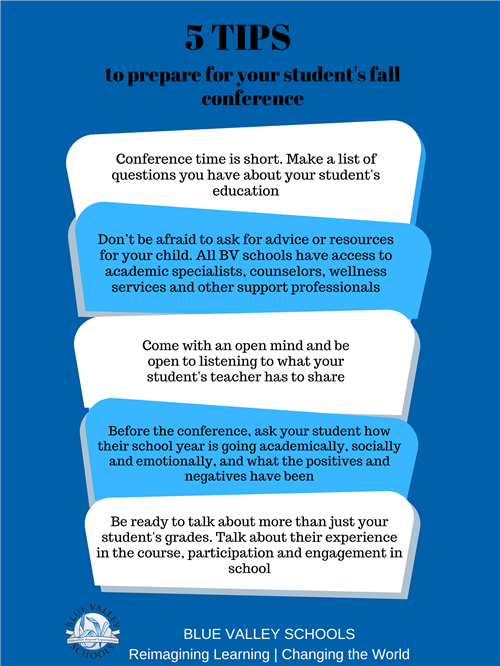Learning Connection
Page Navigation
How do conferences play a role in developing the family-school partnership?
When families walk out of Blue Valley’s fall conferences, teachers want families to know how much they care and love their students and that they are on the student's side.
Emily Gill, a gifted teacher at Overland Trail Middle, knows how vital it is to have families on every student's team.
“We are an advocate for the student, and we are all working toward the same goals,” Gill said. “Anytime you have time set aside to build relationships, it’s going to benefit everyone. Later on, if a problem arises, I know as a parent myself that I’ve already met someone, and they are on my child’s team.”
Many Blue Valley teachers see fall conferences as one of the initial opportunities to develop a partnership with students’ families. Conferences also open the door for families to share about their child and get ideas for how they can support their student’s learning at home.
“We get to gain some insight into students’ needs and their home lives and how that translates into the classroom,” said Allison Lunsford, third grade teacher at Sunset Ridge Elementary. “I think teachers really use this knowledge to create the best learning environment for their students and to use the best strategies to meet the students needs.”
Conferences might look different at each level, but one element rings true throughout all Blue Valley schools: conferences are vital to building family-school partnerships and developing a healthy school culture.
“That bond, that partnership is crucial for us to make this a place that students like being at and our staff likes teaching at,” said Tyler Alexander, Blue Valley Southwest principal.
How do teachers prepare for conferences? What can families do in preparation?
Gill prepares for conferences weeks in advance by looking at assessment data and scheduling meetings with families. The Overland Trail Middle team also begins having conversations about the social-emotional health of each student and positives and negatives that might need addressing.
At Sunset Ridge, Lunsford analyzes data, looking for areas her students can grow and decides how to communicate that information to families. She also compiles classroom observations and pulls student work to share with families.
Sarah Dolence, a math teacher at Blue Valley Southwest, prepares for conferences by reviewing her student’s grades and taking a few minutes to write down what she has learned about each student since the start of the school year.
“I don’t want to just talk about their grades because they are not just a number,” Dolence said. “They are an individual, and they have other things going on, so I want parents to know I also recognize those things.”
Families are encouraged to come to conferences with questions or concerns they have regarding their child.
Dolence said she enjoys when families share information about themselves as it helps paint a better picture of the student.
What do teachers want families to take away from conferences?
Dolence wants families to leave conferences knowing there’s always room for improvement and knowledge on how they can help their student succeed. Families should walk away feeling heard.
“Sometimes there’s something going on at home or something about their student that I haven’t learned about yet, and that’s really important information for me to know so I can keep it in mind,” Dolence said. “I want parents to leave knowing I understand their child.”
Lunsford said she wants families to leave conferences feeling comfortable leaving their child in her care seven hours a day. It is a bonus if they walk away with tips and tricks.
From the building level, all staff members want families to leave conferences knowing teachers aren’t solely focused on student grades. They have an understanding of who the students are.
“I hope there’s a partnership created during conferences, especially if there are areas of growth that are needed,” Alexander said. “I’m hoping that our teachers are conveying that to parents, and then parents can go support in their role as a parent, so it’s multi-beneficial.”
Conferences should be a positive experience for families.
“We want them to come away feeling like these adults know their child and love their child, have empathy for their child,” said Trent Stern, Overland Trail Middle principal. “But I also think we want parents to leave feeling like they gained some knowledge and some insight about their child as a learner, as a human and in some instances, when perhaps a student might be struggling.”
How do conferences positively impact the family-school partnership?
Whether it’s conferences, back-to-school nights or other clearly-defined family-school events, those are opportunities for family-school partnerships to develop and grow.
“This is really ongoing communication,” said Mary Riley, Sunset Ridge Elementary principal. “Our staff does a really great job at communicating with our families throughout the year. This is that face-to-face opportunity to really focus for a set period of time.”
Students attend school seven hours a day, five days a week. But growth and development happen 24 hours a day, seven days a week.
“It’s vitally important to build that partnership and keep the child’s needs and well-being at the center of that conversation,” Stern said. “We don’t always see the impact or know what’s happening outside of school and how that filters into school. Anytime you have the ability to partner and get a snapshot of that and being on the same page, I think it helps the kid exponentially.”
It takes a village to ensure students are successful.
“Our building and our district do a great job of wrapping around our kiddos while they are here at school, so I just want families to feel their kids are in good hands,” Riley said.


